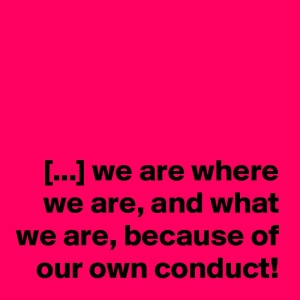Think and Grow Rich is a book written by Napoleon Hill. It was first published in 1937, with a few more years of The Great Depression having the world in a firm grip. I picked up a copy in India some eight years ago, but again, never got around to reading it. until now – this was one of the books I decided to read for my English reading challenge of the year. The copy I picked up was the original unabridged version, and in a sense that’s a shame. Because it is dated. The way it is formulated, the actual style of the writing is a bit… well, it’s as if Mr Hill believe the reader to be a bit obtuse, so he’s capitalizing the most vital parts, and that in and of itself rubs me the wrong way.
I also do not like how 99% of all of his examples of successful men, are actually men. The women are few and far apart, and basically show up at the very end of the book. Two, or possibly three examples of ladies as successful role models to mimic, the rest of the time when women are mentioned speaks of “our” ability to wrap men around our little fingers. (I trust I don’t have to even begin to explain why this get’s me all riled up?!) But, given the fact that the book was written close to a century ago, I tried to let this slip.
And once I do that, sure, this is a book that has its virtues, for sure. And given the fact that this is actually one of the most successful books of all time, it would be weird if it didn’t right? Read what it says on Goodreads about Hill and this book: “Hill’s most famous work, Think and Grow Rich (1937), is one of the best-selling books of all time (at the time of Hill’s death in 1970, Think and Grow Rich had sold 20 million copies).”
Here are a few of the passages which spoke to me for one reason or another:
Open-mindedness is essential for belief. Closed minds do not inspire faith, courage, and belief.
Every man is what he is, because of the DOMINATING THOUGHTS which he permits to occupy his mind.
 Knowledge is only potential power.
Knowledge is only potential power.
[…] the word ‘educate‘ is derived from the Latin word ‘educo‘, meaning to educe, to draw out, to DEVELOP FROM WITHIN.
Any man is educated who knows how to get knowledge when he needs it, and how to organize that knowledge into definite plans of action.
The person who stops studying merely because he has finished school is forever hopelessly doomed to mediocrity, no matter what may be his calling. The way of success is the way of continuous pursuit of knowledge.
[…] we are where we are, and what we are, because of our own conduct!
A book worth reading? Hm. Yes. It is. But I hope (and trust!) that there’s a revised edition more recently re-worked, and if I were you, I’d pick up such a copy instead of the original unabridged version.
The book I am blogging about is part of the book-reading challenge I’ve set for myself during 2018, to read and blog about 26 Swedish and 26 English books, one book every week, books that I already own.